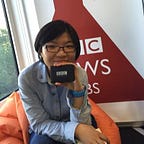From Journalist to Technologist: Labber Lei He
Labber Lei He shares her journey from a journalism student to the software engineer behind the BBC’s first news chatbot.
As a high school student in China, the BBC was primarily a means for me to teach myself English. Back then, I took BBC as a world-class news provider that produces professional and in-depth content on all mediums.
I didn’t think about the technology that goes into producing and delivering the news. It wasn’t until I came to the UK to study journalism and began researching different news organisations that I realised how big a role technology plays in the BBC.
From Journalist to Journo-Coder
There were individual teams at the BBC that sparked my interest when I was a student. Visual Journalism’s bespoke interactives, such as “Which sport are you made for?”, and Connected Studio’s Taster platform, which allows users to play with and rate new formats and audience experiences, showed me that the BBC values innovation in storytelling. Having been introduced to coding on my journalism course, I began to think about whether I could make these sorts of experiences myself.
My initial objective was just to make a website. In addition to the coding instruction on my course, I did a lot of online tutorials and read a few books to learn the basic technology of building a website with HTML, CSS and JavaScript.
This led me into a wider world of technology, such as full-stack web development, data visualization, NLP (natural language processing) and virtual reality. Suddenly, I had ambition to build even cooler projects. I felt the programming skills I gained from the journalism course were quite limited, so I decided to do another Master’s course in Software Engineering to get a more systematic understanding about building softwares properly.
Using Technology to Explore FIFA Corruption
I got to know News Labs during my second degree. It was back in 2014 that I took part in TechRaking London — a hackathon run by Google News Lab and the Centre for Investigative Reporting. After being introduced to members of the team, I was invited to attend one of their fortnightly “Family Days” for demoing new projects and knowledge-sharing.
I was fascinated by the diversity of projects coming out of News Labs, and by the Juicer API in particular. The Juicer takes articles from the BBC and other sites and automatically identifies entities — people, places and things — that can then be used for searching and analysis. After getting an API key, I built a responsive FIFA Corruption Interactive Map that shows real-time global news headlines of FIFA Corruption from BBC Juicer and gives instant view of different countries’ involvement in FIFA Corruption. This project also formed part of my second Master thesis, which focused on new techniques in data journalism.
I ended up applying for a position with News Labs firstly because of the opportunity to work on different projects with relatively flexible deadlines and collaborate with different internal teams, as well as universities. I was also excited to participate in a variety of industry events and conferences which keep me up to date with emerging technologies and trends in media.
Part of the News Labs Family
I was amazed by the amount of help, support and — more importantly — trust I got during my internship at News Labs. As a new joiner at the time, I was given the opportunity to be the main developer for the BBC’s first chatbot, BBC Mundo Messenger Bot. The bot gained over 1000 subscribers in three days, and as of June 2017 the bot has about 58,000 subscribers.
By completing this project, I learned loads of things that I wouldn’t have at universities, like how to communicate with editorial staff and stakeholders directly and how to work efficiently with UX designers. Technically, I learned how to properly architect a public-facing BBC project at scale, the deployment pipeline including continuous integration, delivery and deployment, and how to meet the strict BBC information security standards.
Apart from the Mundo bot, I’ve also been involved on a number of other projects. I’ve worked on:
- External Linking, a prototype that uses BBC Juicer to introduce automated external link recommendations for BBC News story pages to help the BBC achieve its goal of generating 10 million referrals to local media outlets;
- Atomised News (Newsbeat Explains), an audience-facing mobile web prototype that explores new ways to draw young audiences to rolling news stories;
- Structured Journalism, to find pragmatic and practical ways to structure journalism narratives, in order to help News organisations curate stories that scale, adapt and connect across platforms and use cases.
I’m currently working on Voice User Interfaces, exploring the best way to offer BBC content on the devices like Google Home, Amazon Echo and Apple Home Pod.
Although what I’m doing now is different from where I started, the goal for me is the same: it’s to help people get more informed about what’s going on in the world and, more importantly, help deliver relevant content more effortlessly. Instead of producing content, I’m now using technologies to explore new ways of engaging with audiences and trying to build the future of news. There’s a lot to explore, such as machine learning, personalisation, virtual and augmented reality, language technology and so on. I’ll continue to collaborate with journalists, researchers, designers and software engineers to build even more useful tools for journalists and new experiences for audiences.
Now You!
There are tons of opportunities for getting involved with the BBC and gaining work experience. The BBC has apprentice schemes for school leavers and trainee schemes for graduates in fields from engineering and UX design to digital journalism and sports reporting. You can check out past and present trainees’ experiences on the BBC’s Get In blog.
This piece was originally written before we participated at an away-day for girls aged 15–19 to introduce them to the technologies we use in our everyday work.
